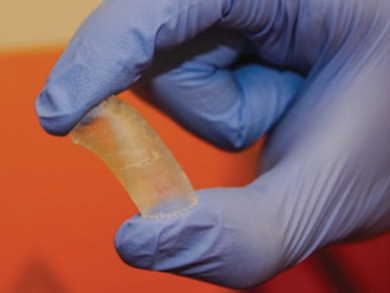Congenital heart disease is the most common form of birth defects in humans. Treating this condition often involves replacing damaged vessels with grafts. Due to anatomical differences, each patient can present a unique problem. Additionally, complications such as calcifications, obstructions, and infection can arise easily.
John P. Fisher, University of Maryland, College Park, MD, USA, and colleagues have developed 3D-printed vascular grafts that can be customized for each patient. The grafts consist of a poly(propylene fumarate) (PPF), a biocompatible and biodegradable polyester. They were printed using digital light stereography, a layer-by-layer hardening of the resin using projected light. After printing, the grafts were exposed to UV light to increase crosslinking. The material can support the growth of new vascular tissue.
The team printed grafts with a diameter of 1 mm and a wall thickness of 150 µm. The printed products were tested in the venous system of mice for six months. The results showed that the material can be sutured, has the necessary mechanical strength, and performs without problems such as stenosis or thrombosis. According to the researchers, the approach can be expanded and used for more complex vascular geometries.
- 3D-Printed Biodegradable Polymeric Vascular Grafts,
Anthony J. Melchiorri, Narutoshi Hibino, C. A. Best, T. Yi, Y. U. Lee, C. A. Kraynak, Lucas K. Kimerer, A. Krieger, P. Kim, Christopher K. Breuer, John P. Fisher,
Adv. Healthcare Mater. 2015.
DOI: 10.1002/adhm.201500725



